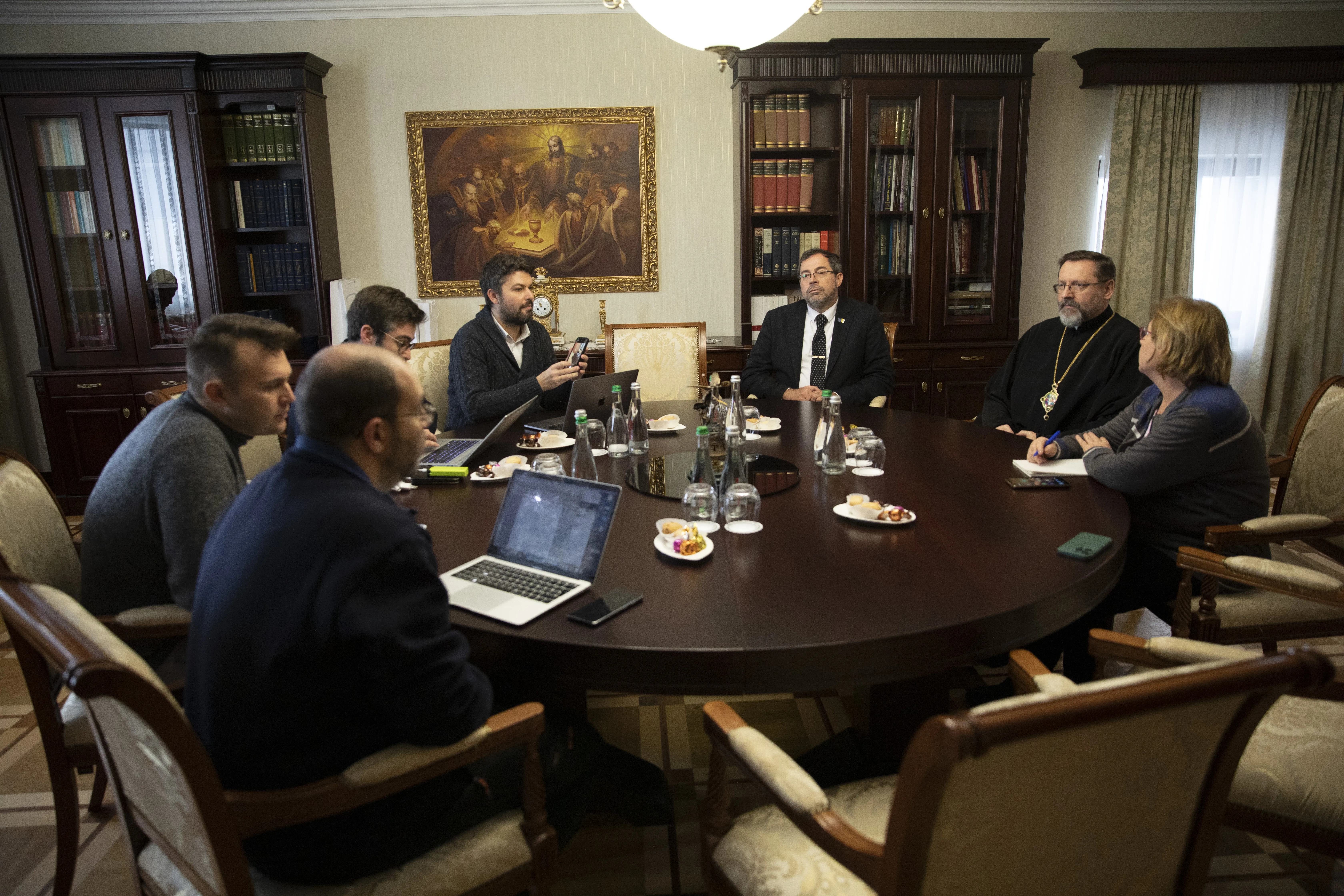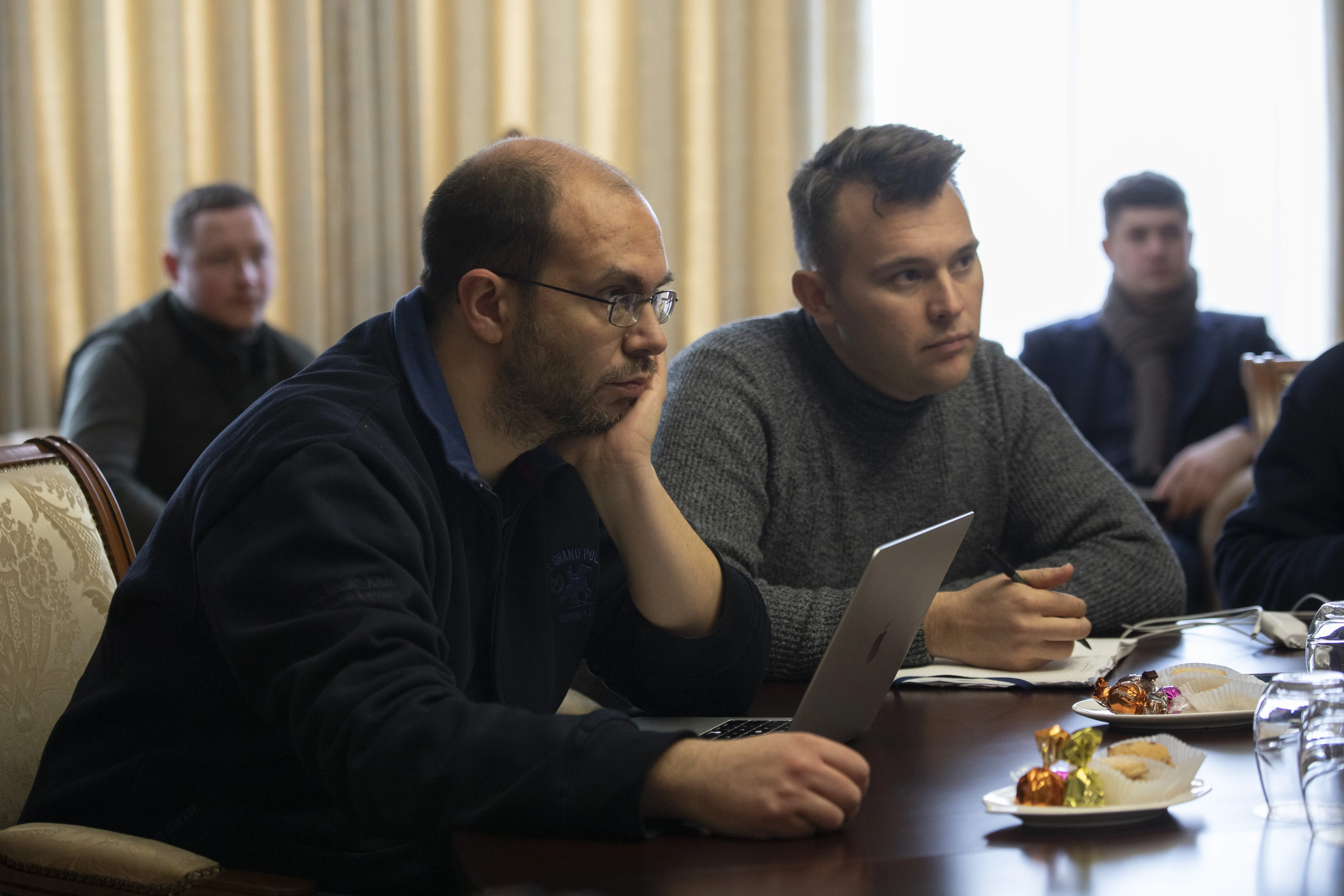Ukrainian Archbishop: ‘Many Will Sing Christmas Carols With Our Soldiers’
According to estimates, a third of the Ukrainian population has been on the move in the wake of the invasion.

For months, the Greek Catholic Cathedral of the Resurrection in Kyiv was a refuge for more than 200 people. They made the basement a shelter against air attacks. In those days, Major Archbishop Sviatoslav Shevchuk walked around in a bulletproof vest and a helmet, trying to comfort the afflicted.
Currently, the major archbishopric complex is building a kitchen to let up to 100 people cook their own meals at a time — in the hope that it will convince people to stay.
Many citizens in Kyiv have gotten used to war, Archbishop Shevchuk said. “We have learned to recognize noises,” the head of the Ukrainian Greek Catholic Church told a group of journalists on a recent trip to Kyiv organized by the Polish and Ukrainian embassies to the Holy See.
Recognizing the noises, the archbishop explained, meant you understand there are usually two or three missiles launched at one time. So you no longer bother to seek shelter under some circumstances, instead waiting for the attack to end.
An ongoing problem is the power supply: The capital has electricity in 75% of its territory, and there can be sudden blackouts. In cities closer to the border, like Kharkiv, there are curfews at night, and all the lights are blacked out.
In a country where the temperature can reach -4 degrees Fahrenheit (-20 degrees Celsius), having no electricity means having no heating in freezing conditions, no access to stoves in many cases, and no access to other kitchen devices.
Life has become very complicated, and the third wave of temporary migration from Ukraine has begun. Archbishop Shevchuk called those fleeing the cold and the lack of access to power and heating “thermal migrants.”
Not all of those fleeing the cold are destitute. On the train that took journalists back from Kyiv to Przemysl, there were three young women who left their homes to spend the winter in Prague, where they had someone to take them in.
Another woman was off to visit her daughter, a student living on the Côte d’Azur in France — she is considering whether she should join her permanently — and one young woman was leaving for a holiday in Spain.
These were people with economic means who preferred to leave for a while. They were not permanent migrants or refugees.
At the same time, some people choose to stay. Hence the initiative of the Ukrainian Greek Catholic Church, which hopes to give everyone a chance to cook a warm meal and thus find one less reason not to leave. After all, war is also won this way, with a constant presence in a place from which one is invited to leave. But it’s not just that: The population has organized itself to immediately fix what is destroyed, so as not to give the idea of bowing to any enemy provocation.
For Archbishop Shevchuk, “peace means above all the absence of war, which for us means winning, getting the enemy to go away. Peace in our imagination means stopping these military actions. Stop killing us. That will be the first step towards authentic peace.”
“But we know that peace is something deeper than the absence of war,” Archbishop Shevchuk added. “It is not just about winning in war, but winning the very spirit of war, the war in its causes, the source of authentic and lasting peace.”
In the meantime, for many people, an important means of support is provided by Church initiatives. The head of the Ukrainian Greek Catholic Church said that people looking for accommodation arrive in Kharkiv from the “martyr city” of Izium and Kupiansk. They receive a payment equivalent to $50-$80 from the government — not enough to pay for even the most urgent things. And Kherson, which has just been liberated, is still suffering, he said, and in need of aid.
There are two ways in which the Church provides aid — through Caritas and through the parishes, where family homes and various initiatives are provided. There is also a foundation of the patriarch, managed by the major archbishopric, which seeks to provide nutrition: The food parcels feed a family for a week and so are not dependent on spontaneous arrival of humanitarian aid, Archbishop Shevchuk explained. “We try to procure this food in a stable way. Let’s just say it’s a bit of a ‘patriarch’s ambulance.’”
According to estimates, a third of the Ukrainian population has been on the move in the wake of the invasion.
“We have recorded five waves of internally displaced people, and not all of them have taken people out of Ukraine,” Archbishop Shevchuk said.
“In the beginning, those who had the economic means were trying to stay safe. The second wave were those of the middle class, people who had their own transport, cars, and could pay for a few hotels. The third wave were people with nothing, fleeing their homes empty-handed. So, the fourth wave were those who fled last and didn’t want to go too far from their cities.”
Finally, “the fifth wave, that of thermal refugees who flee not so much from the war but also the cold, and are crowding central-eastern Ukraine.”
The mayor of Kyiv called for people to leave the city. Archbishop Shevchuk said the town, on the other hand, had gone through “many stages of survival.”
The most desperate situation was when the Russian invaders first arrived at the 2022 Battle of Kyiv, when bridges were closed, about 10 miles from the fighting line.
“It was the first few weeks,” Archbishop Shevchuk said, “and even on these islands on the Dnipro River there were anti-aircraft defense systems; we could see fireworks from our window and it was dangerous. But then we got used to it, because not everyone flees to the shelter with every air raid alarm; people don’t pay attention anymore.”
After the Russians left, they discovered the atrocities committed in Bucha, 15 miles from the capital.
The most potent weapon, Archbishop Shevchuk said, is still resilience. Ukrainians go home; they don’t run away forever. And, when they’re in the area, they fix everything.
He told the journalists how his daily video message came about, which was more a way to certify his survival in the midst of war, but which then became a necessity for people.
“After three weeks, I wondered if it was worth continuing, then I went to Zytomir, which was also martyred every day. On a Saturday, 21 missiles fell on the city. There an old lady told me: ‘We are terrified, it is good that you talk to us. It doesn’t matter what you say, it matters that you talk to us. This reminded me of a situation I experienced as a doctor, because I had worked in an intensive care unit. I saw a dying man who said to his wife: Talk to me! And she began to read even though he could not follow.’ We don’t always have to carry super-intellectual messages and it is important to accompany these people. We cannot change the circumstances, we can change our way of life in a Christian way.”
It will be a difficult Christmas, but not like last Easter. “We have the custom of singing Christmas carols, which are part of our way of living Christmas sung by visiting neighbors and those who are most in need to bring and share joy and send good wishes,” Archbishop Shevchuk said. “I also remember when these Christmas carols were a form of protest against the atheist regime: People sang because in this way they won violence, because the carols sing the event of the birth of Jesus Christ.”
“I know that many prepare to go to the front and sing these Christmas carols with our soldiers, making a semi-theatrical representation of the event applied to our existential situation.”
“We are forced to fight for our survival,” Archbishop Shevchuk said, “and for us peace means healing the wounds of our people, because we are all wounded.”
- Keywords:
- archbishop shevchuk














